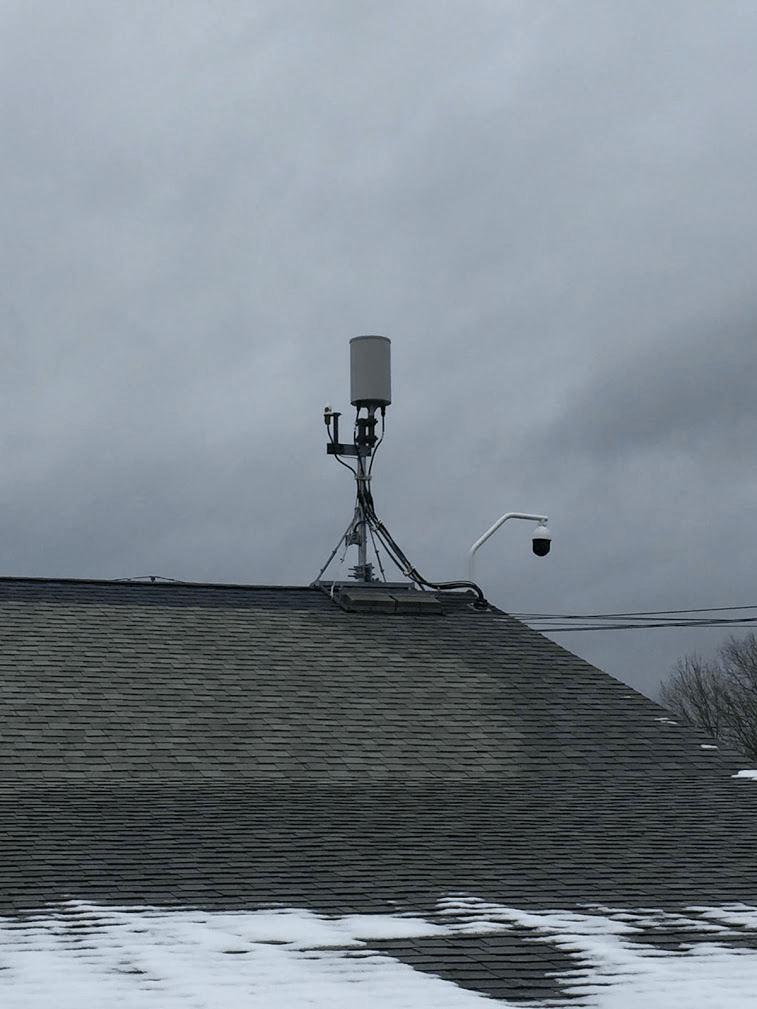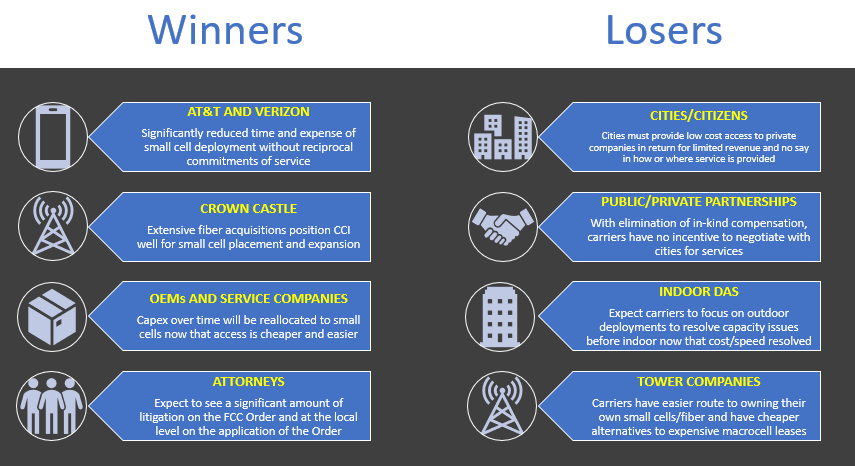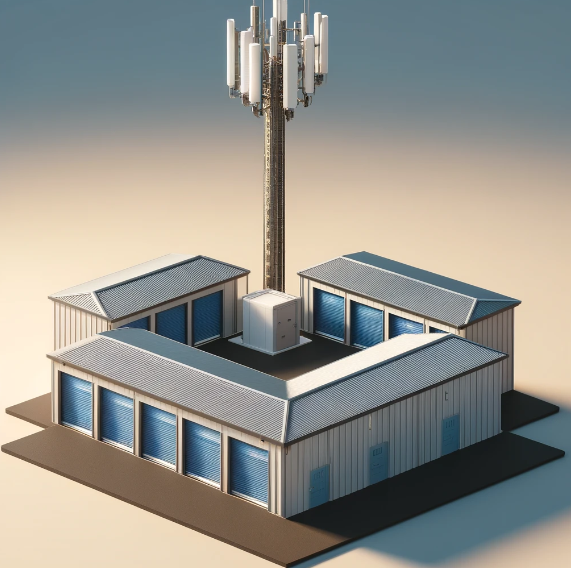One Step Forward, Two Steps Back; Verizon’s Small Cell Agreement with Syracuse
As a resident of the Syracuse area, I am excited to see Verizon and their interest to bring 5G via 600 small cells to our fair City. However, in their rush to try and become the “first fully 5G city,” the City of Syracuse seems to have bent over backward when entering the agreement with Verizon for small cells throughout the City. Make no mistake, there are benefits to becoming a 5G city, but this agreement no more means Syracuse will be the first fully covered 5G city than it does for other cities where Verizon promised the same thing when pitching similar lease agreements. But at least some of the other cities didn’t enter into such a one-sided agreement. For example, see agreements entered into with Sacramento, San Diego, or San Jose, each of whom receives better terms and conditions than Syracuse did and will have a robust small cell deployment as well.

SYRACUSE COULD NOT PREVENT VERIZON FROM ADDING SMALL CELLS TO ITS RIGHT OF WAYS
It is important to realize that Syracuse really didn’t have much choice of whether to allow Verizon to access the city public right-of-ways and structures due to the FCC’s Third Order regarding small cells. While the City could have negotiated a higher amount for the pole access rights or permit fees, they would have had to demonstrate that their actual costs in reviewing small cell applications and maintaining the right-of-ways were higher than the nominal fees allowed for in the FCC Third Order. As it stands, the City had to reduce its annual fee for small cells from $950/year to the FCC mandated $270/year. Over the next 10 years, that means that the City will receive $1.6M from Verizon instead of $5.4M for the small cells.
BUT THEY COULD HAVE ENTERED A LESS ONE-SIDED AGREEMENT
Our concern isn’t that the City entered an agreement for 5G or that they did it with Verizon. Our objection is with this actual agreement. It seems that the City was so anxious to become a leader in 5G that they ignored the obvious issues with the agreement. Here are our concerns with this agreement:
- The City has granted rights to Verizon for upwards of 45 years when it didn’t have to. The city signed a master license agreement is for 20 years, with a very limited right for the City to terminate the agreement. The master agreement details the general rights of the parties and is for 20 years. Then there is a separate pole license for each pole that will be used or installed that runs up to 25 years from the date the pole was installed. Thus, if a pole is installed in year 20, it will be there for another 25 years thereafter. In short, the City is entering a possible 45-year agreement. However, there is no requirement in the FCC Third Order about the minimum number of years a City must sign an agreement for. While Verizon surely prefers a much longer agreement, there are other cities which are entering much shorter 10-year agreements with Verizon. Here we question what benefit, if any, the City gets from a longer license agreement. Verizon retained the right to terminate “at any time for any reason or no reason by written notice to the City,” but the City does not. So, in essence, the City is now committed to this specific agreement legally, regardless of what happens with technology in the future. While there is a limited right to terminate if a court of law or Congress revokes or repeals the Third Order, this is narrowly drafted.
- The agreement entered into by the City concedes unnecessary rights to Verizon under contract law. The agreement is substantially the same as other agreements proposed by Verizon to other cities. It attempts to incorporate many of the standards from the FCC Order into the license agreement. The issue here, from a legal perspective, is that these clauses did not need to be in the license agreement. If Verizon felt the city was not adhering to the FCC order or was discriminating against Verizon, Verizon by default has the option of requesting relief from the FCC or filing in federal court for injunction or damages. However, by adding the language in the license agreement, Verizon can now file in state court on a civil claim if Verizon believes that the City is in breach of the agreement. There is absolutely no benefit to the City of Syracuse to including this language in the license agreement.
- Other cities have received additional compensation in the form of public safety or IOT monitoring and services, higher fees to help pay for additional staff to review small cells applications. The City of Syracuse received nothing. In fairness, the other cities are bigger and more important to Verizon than Syracuse. Nonetheless, the only concession Verizon appears to have made to the City of Syracuse is the requirement for Verizon to monitor a limited set of small cells for compliance with applicable radio frequency emission standards. There are no actual commitments by Verizon to deploy a certain number of small cells by any date. No requirement to deploy in the poorer areas of the city. No smart city initiatives or commitments to fund research on how 5G can benefit the residents of Syracuse.
- The agreement gives the City very limited rights to terminate even if health risks are identified and proven in the scientific community. Syracuse procured limited rights to have Verizon monitor their small cells to confirm they comply with the FCC, ANSI, and OSHA requirements regarding radio frequency emissions. The City, in what appears to be an effort to appease its citizens that small cells are safe, inserted language that requires the testing of the small cells to confirm that they meet the minimum applicable health, safety, and radio frequency regulations. Verizon is required to test up to 5% of all installed poles each year to confirm they comply. Meanwhile, the City is allowed to test any pole themselves for compliance, but they already have this right to test any small cell without the agreement. Conceptually, there could be clear evidence of harm from small cells but no change in the applicable regulations and the City would be powerless to terminate the agreement until the small cells no longer meet the regulations. While we don’t believe that there are health risks from small cells, that doesn’t mean that the issue could not have been addressed better in the license agreement. Alternatively, if the license agreement was shorter in term, the City could have simply terminated at the expiration even if there were no regulations. By agreeing to a long-term license with limited rights to terminate, the City could be legally committed to Verizon small cells in the public right of way even if there is ample evidence of why they should be removed.
- By agreeing to such a one-sided agreement, the City has condemned itself to agree to similar agreements with ANY company providing wireless services who want to deploy in the ROW. Under the FCC Order and previous case law regarding the Telecommunications Act of 1996, the City may not discriminate between similar providers of wireless services. By agreeing to the terms with Verizon, the City will have a difficult time agreeing to different terms with other providers regardless of what happens or doesn’t happen with Verizon.
It seems to us that someone was motivated to push this through quickly. Verizon would have entered the agreement without many of the concessions that the City willingly agreed to. Again, while 5G coverage over the City is an admirable goal, this particular agreement is overreaching and could have been drafted better on the City’s behalf. The proliferation of small cells requires careful management by cities. As we have pointed out before, Verizon was on the winning side of the FCC 3rd Order and cities are on the losing side. This particular agreement though could unnecessarily put Syracuse even further on the losing side. As a resident of the Syracuse area, I applaud the City entering an agreement with Verizon for small cell deployment, just not this particular agreement.













1 thought on “One Step Forward, Two Steps Back; Verizon’s Small Cell Agreement with Syracuse”
This small cell order reminds me of our previous consultant’s remarks over recent years, to the effect that Verizon was becoming intertwined with government to the point that the company might become almost a government entity itself, able to use eminent domain for takings rather than have to negotiate contracts. “Consider how much the government takes in from Verizon in taxes, and consider what their influence over government might be as a result.”